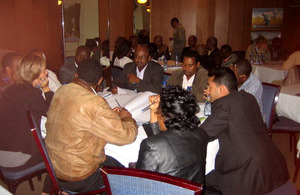DFID Research: Putting water research into practice
A water and sanitation program in Ethiopia is encouraging policy change to improve planning and integration of water and sanitation services

RiPPLE Workshop. Picture: RiPPLE
All too often, research projects do not result in policy change, because they do not take into account the complex realities of a country or fail to include the main stakeholders in the process of research.
RiPPLE (Research Inspired Policy and Practice Learning in Ethiopia and the Nile Region) is a 5-year research programme consortium in Ethiopia funded by DFID to advance evidence-based learning on water supply and sanitation. It set out from the start to do this by setting up ‘learning and practice alliances’ (LPAs) that bring together stakeholders from different organisations to share experiences on issues of joint interest. The organisations represented may be governmental, civil society or private sector, and may work in implementation, policy or research. LPAs can operate at different levels: country, region or woreda (administrative district).
The initial view of some participants was that LPAs would be just another workshop or network. However, since their establishment in 2007, there has been a great change in the perspective and behaviour of LPA members. At a standard LPA meeting, participants identify and prioritise research topics in collaboration with other LPA members and discuss the policy and practice implications of ongoing or completed research. This cycle of driving the research agenda and learning from findings has created a sense of ownership and empowerment: LPA members become active participants in research and lesson-learning rather than passive beneficiaries of external assistance.
RiPPLE itself does not implement water and sanitation schemes, but works in partnership with those who do (government, donors, NGOs and private institutions like World Bank Woreda Support Groups), and aims to learn from their work. The LPAs provide the mechanism by which this is possible.
“RiPPLE has given us an approach on how to go about new ideas and ways of doing things…some important areas which we were able to get much needed knowledge include community mobilization, appropriate technology and quality dimension of sanitation and water projects. Now best practices and other findings from working papers are constantly included in our planning. We have established active communication with other institutions including the World Bank. There is an encouraging trend of connection outside the LPA platform” says Demissie Bubamo, Disease Prevention and Control Department Head of SNNPR, Ethiopia.